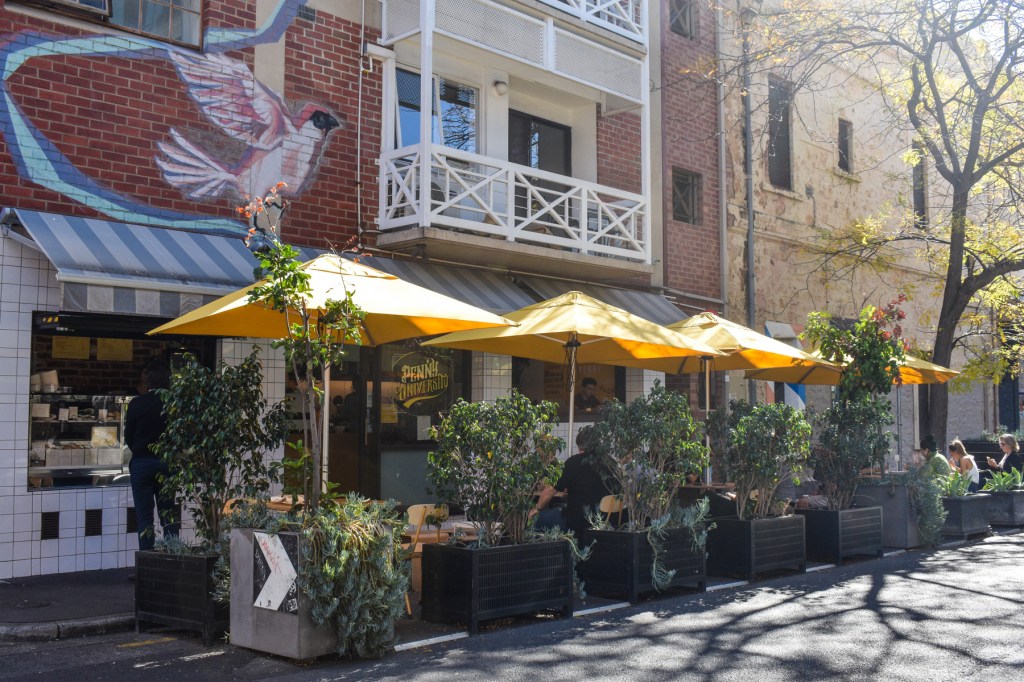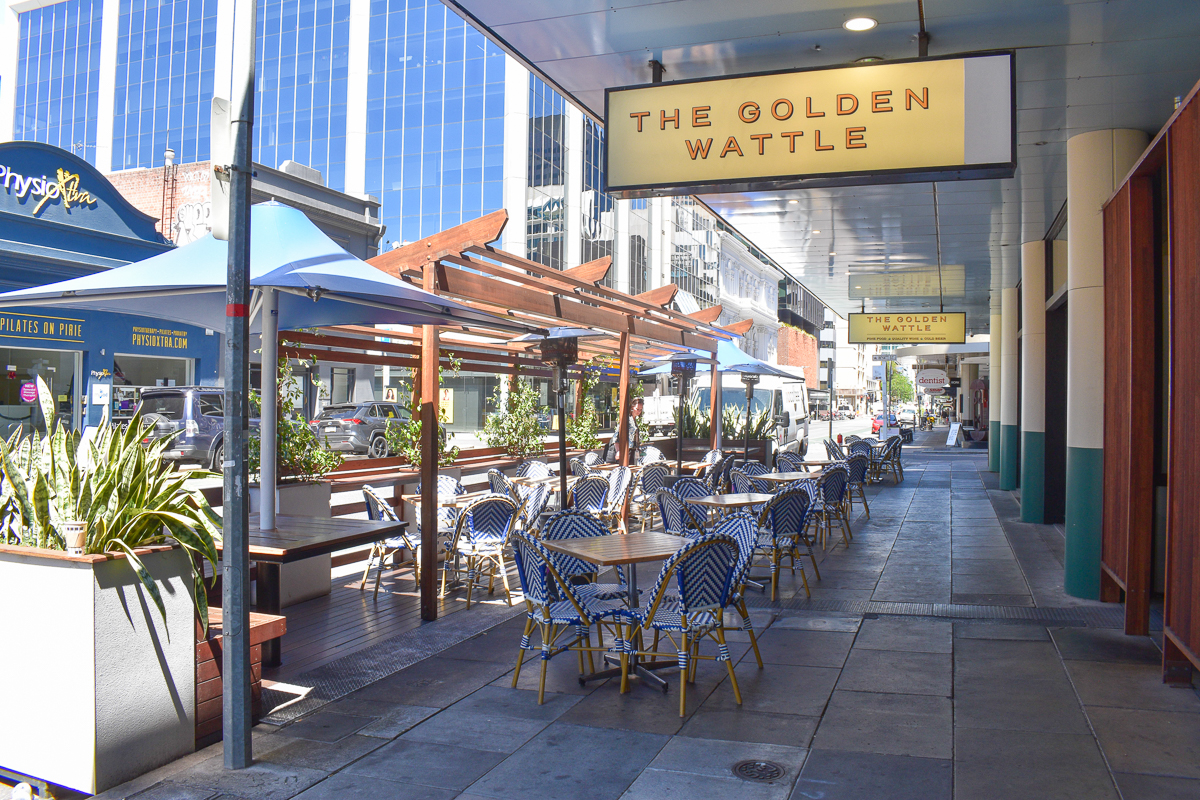Outdoor dining fees hurting hospo businesses in ‘survival mode’

Union Street’s Penny University was an early adopter of green, decked outdoor dining that is now seen around the CBD. But the owner says council fees are hurting small businesses.
Penny University owner Foti Likouras says he had bill shock when the cost of his outdoor dining tripled in a year.
“It just came to me by a shock because it’s such a jump from the previous year, where you’re sort of setting money aside for it, and then it’s like, ‘hold on a minute, that’s not right’,” he said.
Foti says the current rate is $165 per square metre.
This is the highest type of outdoor dining fee the council charges for what’s called a parklet – an area where city businesses have converted paid parking spaces or road space into outdoor dining areas. The cost of footpath dining, rather than the road, is set at $49.30 per square metre.

Penny University has had its current style of outdoor dining since 2016, which Foti said didn’t take away car parking but shuffled bike racks further down the street to install decking on the road, extending the footpath in front of the small cafe.
“Now, people have their planter boxes, people have their decking, and it’s rolled out all from this example,” Foti says.
To activate the city, the council trialled a rollout of these parklets across the CBD in 2021. When the trial phase was over, businesses with parklets were charged two fees: a council fee for the loss of parking revenue and a standard parklet operating fee.
In its upcoming 2025-26 budget, the council has simplified the model so there’s one parklet fee instead of two and introduced quarterly invoicing, where businesses were previously billed annually.
You might like
This came after Golden Wattle co-owner Damien Kelly told the council’s City Finance and Governance Committee in April that the parklet fees can disincentivise businesses.
While Kelly said for the Pirie Street pub, the parklet fees are comparable to its indoor dining space, “there were different levels of how people were charged”.

But Foti says there are still fee hikes that are hurting small businesses operating in “survival mode” since the hospitality landscape changed post-COVID.
“Businesses are in a sort of survival mode, everyone’s too focused and concentrating on trying to gain that business,” he says.
“You’re highly stressed, and you’re paying some bills that you’re not actually looking further into.”
For Penny University, they have only 11 square metres of outdoor dining space, which, as winter approaches, will be largely unused.
“If it’s too hot, we can’t sit out here, if it’s too cold, we don’t have any heating so looking at paying big fees, well how about if we enclose the space then it’s a little more practical but it’s classified as outdoor, it’s weather dependent,” Foti says.
For the financial year 25-26, the $165 parklet fee for an 11 square metre space will cost $1815.
Main street outdoor dining, which is on the footpath rather than the road, is set at $49.30 per square metre for 25-26 and would cost $542.30 for an 11 square metre space.
For somewhere like Penny University, the Union Street footpath is too narrow to dine, which is why they installed decking on the road that’s classified as a parklet.
Foti says since the council reintroduced outdoor dining fees after freezing them in 2022, the fees have been inconsistent.
Subscribe for updates
“Last year they had it at a ridiculous price as well, I argued that point, they brought it back down understanding that around the city, everyone couldn’t pay those fees and they notched it back, then they tripled it again,” he says.
“So, you’re just not knowing what they’re going to give you each and every year and I’ve had enough.”
He says Adelaide should take note from how other capital city councils are treating their hospitality businesses, pointing to Sydney which permanently waived outdoor dining fees in March.
“Adelaide has got to take note, because people’s behaviour has changed within the city, it’s not as busy as it once was, people have gone to suburbs,” Foti says.
“I think council needs to step in to help businesses thrive and survive through this period of time and to look at waiving it.”
In December, former Central Ward councillor Carmel Noon tried to remove the parklet fee and reimburse affected businesses that already paid it, but it didn’t pass the council chamber.
Then, Pirie Street Jack & Jill’s restaurant owner Tom McLean – who owes a total of $36,000 to the council – told councillors the outdoor dining and parklet disparity is “appalling”.
Foti said since there are no current sitting Central Ward councillors, it’s hard to know who to approach to be an advocate for hospitality businesses in the city centre.
“It would be nice to have someone to give a voice into council and let people know what’s going on instead of brushing it off,” he says.
“Looking around, there’s councillors that are advocating in Sydney that stepped in and abolished it because they want businesses to do well.”
Arman Abrahimzadeh is an area councillor, so all of Adelaide’s city wards come under his jurisdiction, and he says every capital city is different.
“It’s great to see another capital city has done it, at the very least what we should be doing is looking at them to see how they’ve managed to make it successful, and if there’s any way that we can adopt either all of it or some of that initiative and bring it over here,” Abrahimzadeh says.
He says the parklet fee changes the Adelaide City Council has made in its upcoming budget don’t go far enough.
“We shouldn’t be looking at outdoor dining as something that’s a burden on us as a council because outdoor dining activates the public realm,” he says.
“One of the things that’s always been on my mind, and that’s always been put to me by these businesses, is that what they’re offering is compliant outdoor dining.
“What they’re offering is a nice, warm, welcoming, safe space for city patrons
“I don’t think we appreciate that, and I think we create an extra burden for these businesses that are essentially trying to do the right thing.”
The council’s 2025-26 budget and business plan is now open for consultation and you can give your feedback via the OurAdelaide website.





